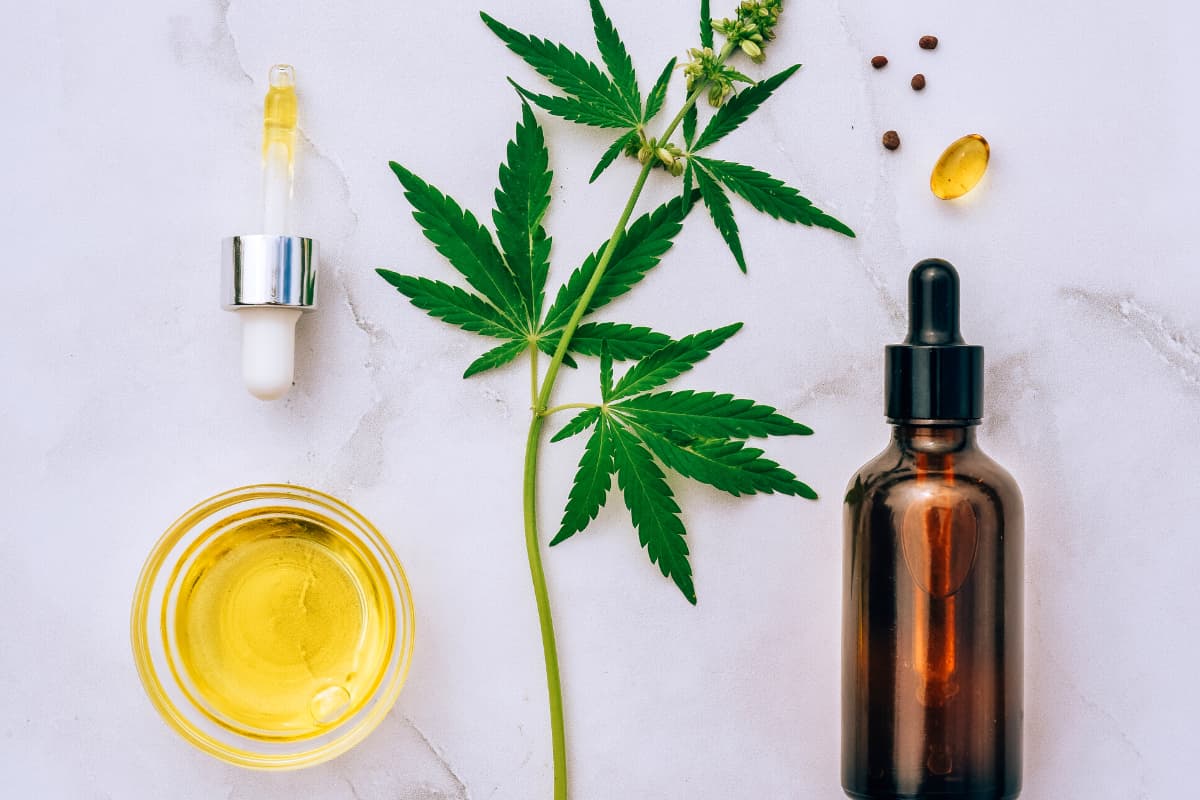Does CBD Work for Menopause Symptoms?

The use of cannabidiol (CBD) is becoming increasingly popular, and it is popping up in our food, beauty products, and health and wellness supplements. But what exactly is CBD, and can it treat menopausal symptoms?
What is CBD?
Cannabidiol (CBD) is a compound naturally found in cannabis plants, like marijuana or hemp. CBD is not psychoactive, which means it does not make you “high.” It can be applied topically with lotions, creams, or oils and can be ingested or inhaled.
CBD and Menopause
As we know, menopause can bring challenging changes to our bodies. More and more women are turning to CBD for a natural approach to symptom relief. But does it work?
Joint Pain
Joint pain is a common issue affecting nearly 50% of menopausal women. This can be partially attributed to the decline in estrogen that happens at this time. Estrogen is anti-inflammatory and helps promote the growth and maintenance of cartilage. It also helps reduce the effects of pain, so it makes sense that our joints are a little achier as we transition into menopause.
Studies have found CBD effective in treating joint pain due to its anti-inflammatory properties. A 2022 study involving 428 people using CBD found that participants reported improved symptoms of joint pain for almost 85% of participants and improved physical function for about 66% of the same population. Another study found that when estrogen-deficient mice were given CBD, they showed improvements in inflammation of their bone tissue. Neither study addressed potential safety concerns, and more research is necessary.
Mood Changes
Perimenopause and beyond can often be a time of mood instability, and this may include irritability, depression, and anxiety. These changes can be partially attributed to the natural drop in estrogen and progesterone during this time.
CBD has been found to improve feelings of anxiety and depression in mice. Another study focused specifically on perimenopausal and postmenopausal women. Over seventy-eight percent of the 278 participants who completed assessments about their CBD use endorsed using cannabis for menopause-related symptoms. More than half specifically found cannabis helpful with their mood and anxiety.
Sleep Disturbance
You guessed it, decreases in levels of estrogen and progesterone can affect our sleep too, and this includes increased hot flashes, night sweats, and bouts of insomnia. This impact is significant because poor quality sleep impacts almost all other aspects of daily life.
Research regarding CBD and sleep is still growing. However, CBD is thought to play a part in circadian rhythm. A 2020 study reviewed the literature reviewing the clinical data on CBD and sleep found that CBD can increase both the total amount of sleep and sleep quality in rats. Human studies are limited, but similar results have been found.
CBD Essentials
Types of CBD
CBD Isolate: CBD isolate is the purest form of CBD available. These products only contain CBD from the cannabis plant and are free from THC. THC is the psychoactive component of hemp plants, and the part of the plant that creates the “high.”
Broad-Spectrum CBD: These products contain all the other naturally occurring components found in the hemp plant. Most, if not all, of the THC, is removed.
Full-Spectrum CBD: These products contain the same ingredients as the broad-spectrum CBD but with trace amounts of THC. This level is usually under 0.3% which is not enough to elicit a “high” feeling often associated with marijuana.
Ingredients
Always read your ingredient list when shopping for a product. Ensure CBD, or hemp extract, is listed as an ingredient. There may also be extra ingredients, like additives or chemicals, that may not be right for your needs. Check the label to see if it shows where the CBD was harvested.
Dosage
CBD dosage is usually expressed in milligrams (mg). Dosages affect everyone differently, so starting with a lower amount is best until you have determined your threshold.
Certificate of Analysis (COA)
As with supplements, buy from a highly reputable manufacturer. Always check for a COA when purchasing a CBD product. This means a third-party source has tested it to rate the quality of the product. It will ensure the ingredients in the product match what is on the label, and it will also include a profile of other ingredients like heavy-metal or pesticides.
CBD Safety
In 2018, the Agriculture Improvement Act was passed and signed into law by Congress, removing hemp from the federal Controlled Substance Act. This act made CBD legal as long as it was derived from hemp. However, some states still consider CBD a controlled substance, so the legality of CBD depends on which state you reside in.
As of this writing, the Food and Drug Administration (FDA) has not approved any non-prescription CBD products. They regularly send warning letters to manufacturers that allegedly have CBD in their products. As part of these actions, FDA has tested the chemical content of cannabinoid compounds in some of the products, and many were found not to contain the levels of CBD they claimed to contain. Also, some companies are sourcing CBD from other countries that don’t have quality products. Therefore, as a consumer, it is imperative to do your research to ensure you are getting a safe, high-quality product.
CBD is generally considered safe for most adults to consume but always talk to your healthcare provider first. Side effects can include nausea, fatigue, and irritability, and some reports have shown incidents of liver damage and interference with other medications.
Research is still emerging regarding the use of CBD during perimenopause and beyond and for a wide variety of health concerns. Until then, do your homework before trying CBD for menopause symptoms and consider other evidence-based solutions.
Looking for more expert tips on managing menopause symptoms? Download Midday from the App Store or visit us at Midday.Health.
Erin Stanton, RDN, MPH, is a registered dietitian and certified lactation counselor residing in Atlanta, Georgia. She puts her master’s in public health degree to good use as a freelance writer focusing on various health and wellness topics, especially those pertaining to women and children.
Sign up for more unique women’s health content
By submitting this form, you agree to the Lisa Health Privacy Policy and Terms of Use
